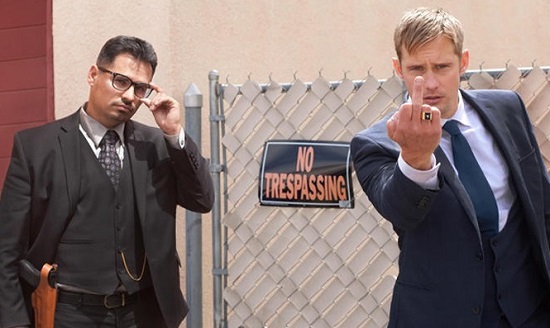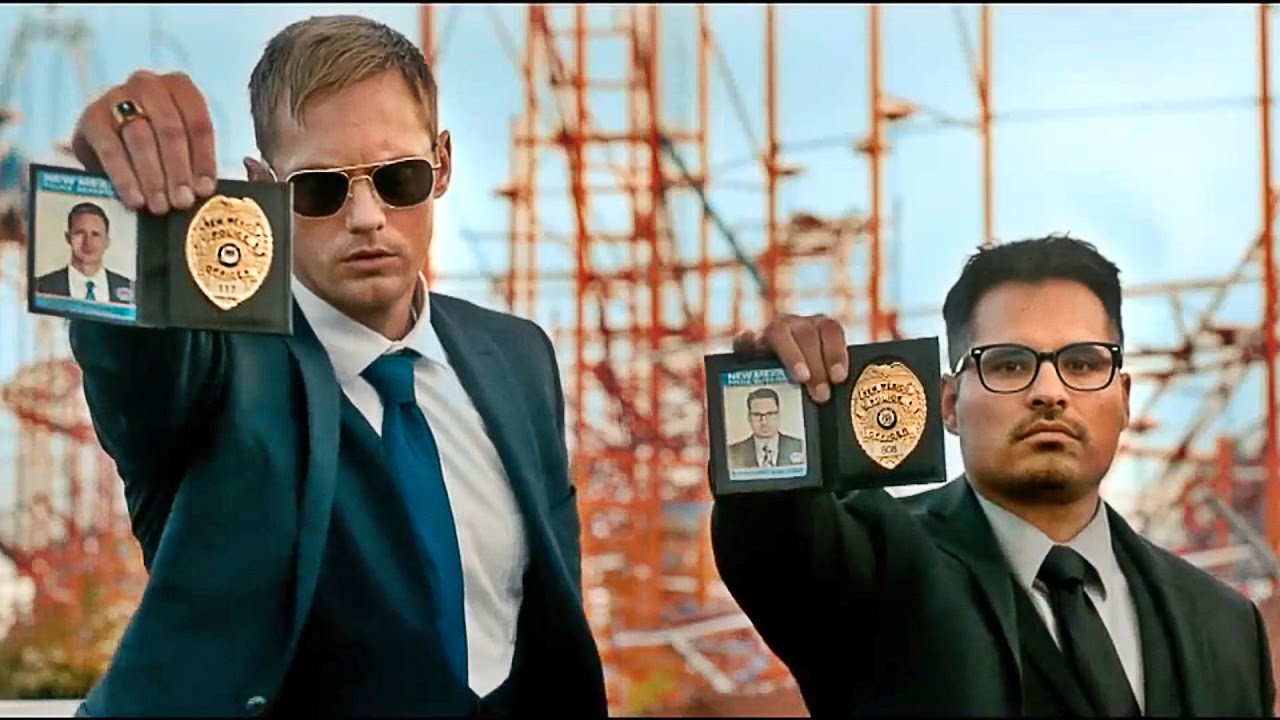John Michael McDonagh is a London-Irish writer and director, and the brother of In Bruges and Seven Psychopaths director Martin McDonagh. Both brother’s films deal with crime and are darkly comedic. Actor Brendon Gleeson is another connection: he has appeared in John Michael McDonagh’s The Guard (2011) and Calvary (2014), and also in In Bruges.
The Guard was a surprising critical and commercial success, and is now the highest-earning Irish film of all time. It follows a bent Irish cop (Gleeson) who is forced to work with a straight-arrow FBI agent (Don Cheadle). He’s the kind of cop who will confiscate drugs from a suspect for his own use, pick the pockets of dead people, hire prostitutes rather than arresting them, and is drunk on the job. When the FBI arrives to try to intercept a big drug shipment, he has to find his own way through the situation.
In Calvary, Gleeson plays a priest on an Irish island who has to battle his conscience over information he receives via the confessional. The film takes an unblinking look at small-town Irish life, and carries more dramatic heft than The Guard or his new film, War On Everybody.
In War On Everybody, two corrupt cops in New Mexico blackmail and jerk around every criminal in town, until they run into one who may be even more dangerous than they are. The title says it all: everyone is fair game for the filmmaker, with no group free from ridicule in the same way no one is safe from the rogue officers. It’s McDonagh’s first US-based film, with Alexander Skarsgård in one of the leads. Skarsgård nabbed the lead via a YouTube video of the actor, drunk and trying to whip a crowd into a frenzy – the director thought it showed exactly the energy level he wanted in the role of the Glen Campbell-obsessed bad detective.
The film radically changes throughout, jumping from an out-of-the-blue trip to Iceland to fast-paced irreverent banter. Absurd characters pop up to add spice to the action, from burka-wearing tennis players to a bank robbing gang of Quakers. McDonagh himself has described it as The French Connection crossed with the Marx Brothers, an apt elevator pitch if there ever was one.
The director’s in-your-face sense of humour comes through in the following Q&A:
How hard was it to get the right tone for the film since it changes quite radically?
John Michael McDonagh: I don’t care about tone. I write and direct the films I want to make. I let critics worry about tone, the same way they have to worry about paying their mortgages.
What films have you seen recently that you liked?
Hell Or High Water, Embrace Of The Serpent, Christine, Bone Tomahawk, Cop Car, Valley of Love. Also La Religieuse by Guillaume Nicloux (the director of Valley of Love), a masterpiece. And The Executioner, by Luis Garcia Berlanga, also a masterpiece.
What was it like doing your first film in the US?
Stressful and boring. I was surprised at how incompetent so many people are in the US.
Do you mind being compared to your brother, since you have a somewhat similar cinematic voice? Do you feel competitive with each other?
I don’t mind being compared with him, even though it’s a really banal and pointless journalistic tic. As for feeling competitive, once my debut feature The Guard became the most successful independent Irish film of all time, I felt like I’d accomplished all I wanted to accomplish, so that was that.
Might the two of you collaborate on a film someday?
No, never.
What’s going on with your film The Bonnot Gang?
It’s still in play. It will probably be my final movie and then I’ll retire.
What do you think about outsiders making films about America? Do you agree with what some have said, that they get the zeitgeist better than Hollywood filmmakers?
No. That’s just a nonsensical, stupid idea generated by European critics. The best films about America have been made by Americans. It is completely idiotic to suggest otherwise.
This film has been called un-PC by some. Where do you think the culture of “political correctness” is heading especially after the election of Trump?
I don’t know and I don’t care. I also don’t know why you’ve placed the phrase political correctness in inverted commas.
What do you think of the “buddy film” genre in general? Do you have a favourite in that genre?
I’m assuming you mean the buddy-buddy film genre, not the buddy film genre. They’re not usually very good. I guess Butch Cassidy And The Sundance Kid is one of the best.
Who came up with the idea of using Lee Hazlewood on the soundtrack?
Me, the director. Who do you think came up with the idea, the fucking caterer?
What do you think of the critical reception the film has had?
Some critics say, “I really like this film.” Other critics say, “I really hate this film.” At the end of the day, it’s all meaningless. I got paid, and we’re all going to die.
Do you think that comedies are somewhat critic-proof?
No. That’s a really stupid question to end on. Well done.
War On Everyone is on blu-ray and DVD now



